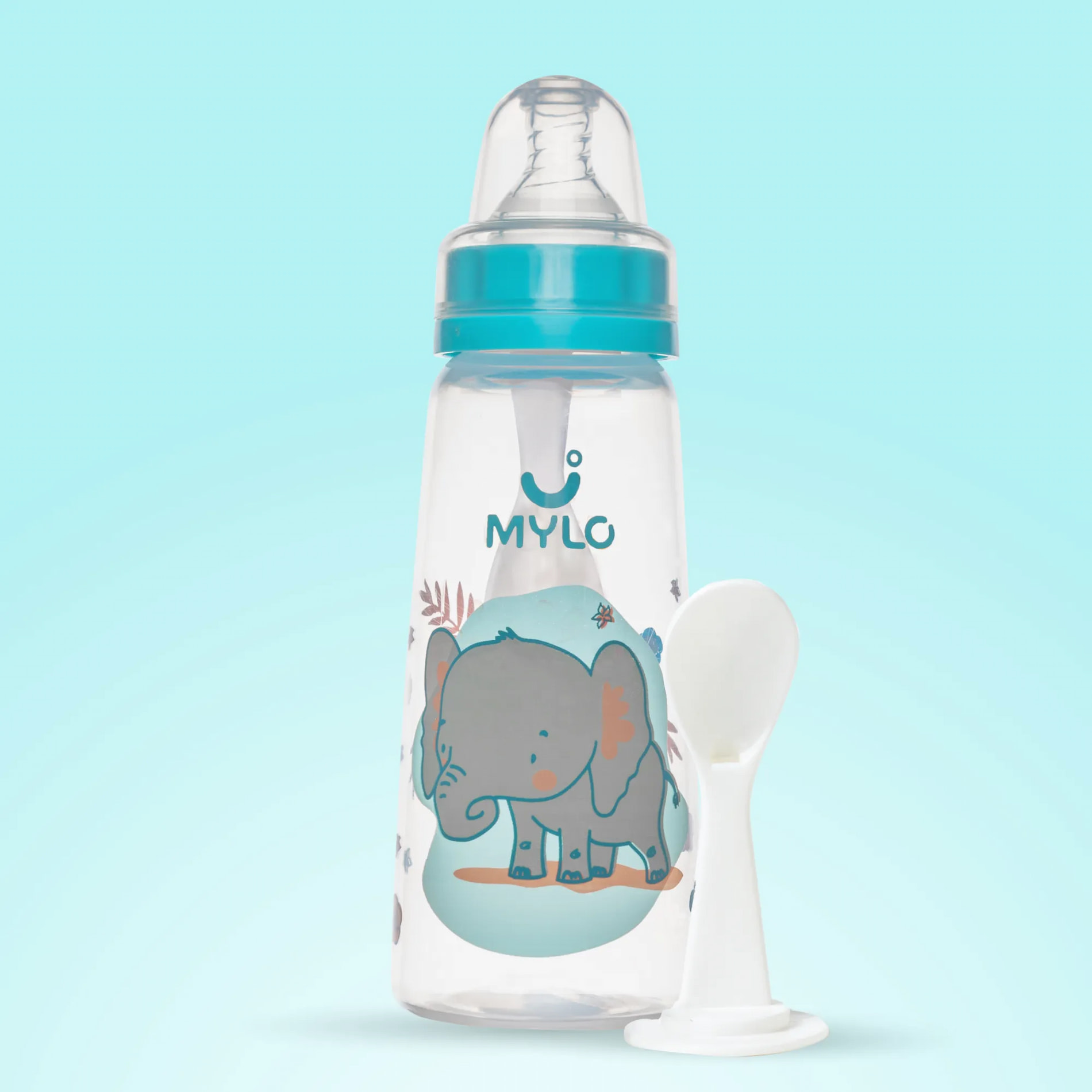Home

Breastfeeding & Lactation

Breast Milk vs Cow Milk: Making an Informed Choice for Your Baby's Wellbeing
In this Article

Breastfeeding & Lactation
Breast Milk vs Cow Milk: Making an Informed Choice for Your Baby's Wellbeing
Updated on 17 July 2023
The debate about breast milk vs cow milk has been ongoing for generations, stirring up passionate discussions and raising important questions about what is best for a baby's health and overall development. In this informative discussion, we will explore the difference between breast milk and cow milk and understand the benefits of cow milk for babies.
What is the Difference between Cow Milk and Breast Milk?
The topic of human milk vs cow milk is significant. Here are some key distinctions:
1. Composition
Breast milk is specifically designed to meet a human infant's nutritional needs. It contains the perfect balance of carbohydrates, proteins, and fats, along with essential vitamins, minerals, enzymes, and antibodies that boost the baby's immune system.
On the other hand, cow milk is intended for the growth of a baby calf and has a different composition. It has higher protein and mineral content but lower amounts of beneficial components like antibodies and certain vitamins.
2. Digestibility
Breast milk is easily digestible for infants due to its composition and the presence of enzymes that aid digestion. The proteins in breast milk form softer curds, making it gentler on the baby's digestive system. Cow milk, however, can be harder for infants to digest due to its higher protein content and different protein composition.
3. Allergenic Potential
Cow milk has a higher likelihood of causing allergies or sensitivities in infants compared to breast milk. The proteins in cow milk, such as casein and whey, can trigger allergic reactions or intolerance in some babies, leading to symptoms like eczema, colic, or gastrointestinal distress. Breast milk, being a natural and customized food source, rarely causes allergies in infants.
4. Immune Protection
Breast milk provides infants with essential antibodies, immune factors, and white blood cells that help protect against infections, illnesses, and allergies. This immune protection is absent in cow milk. Breast milk also contains prebiotics that promote the growth of healthy gut bacteria, supporting the baby's immune system development.
5. Developmental Benefits
Breast milk has been associated with various long-term developmental benefits. It promotes optimal brain development and enhances cognitive abilities, as it contains essential fatty acids like DHA. Breastfed babies have lower risks of obesity, diabetes, asthma, and certain childhood infections.
You may alos like : CMPA (Cow's Milk Protein Allergy): Identifying Symptoms and Understanding Treatment
Nutritional Comparison: Breast Milk vs Cow Milk
Here's a brief nutritional comparison between breast milk and cow milk:
1. Macronutrients
Breast milk contains an ideal balance of carbohydrates, proteins, and fats tailored to meet a baby's needs. Cow milk has higher protein and fat content but lower carbohydrates compared to breast milk.
2. Vitamins and Minerals
Breast milk naturally contains optimal levels of vitamins and minerals required for a baby's growth and development. Cow milk may require fortification to match breast milk's nutrient profile.
3. Fatty Acids
Breast milk contains essential fatty acids, particularly DHA (docosahexaenoic acid), vital for brain and vision development. Cow milk may not have adequate levels of these fatty acids unless specifically fortified.
Benefits of Breast Milk for Babies
Breast milk is widely regarded as the optimal source of nutrition for babies due to its numerous benefits. Here are some key advantages of breast milk:
-
Perfect nutrition
-
Immune protection
-
Digestive health
-
Reduced risk of infections
-
Cognitive development
-
Reduced risk of chronic diseases
-
Emotional bonding
-
Convenient and cost effective
-
Environmental sustainability
It's important to note that every mother and baby's breastfeeding journey is unique. Consulting with healthcare professionals and receiving support from lactation experts can help ensure successful breastfeeding and optimize the benefits for both mother and baby.
Benefits of Cow Milk for Babies
Cow milk can serve as an alternative source of nutrition for babies in certain situations. Here are some potential benefits of cow milk for infants:
-
Provides adequate nutrition
-
Rich in calcium and vitamin D
-
Readily available and convenient
-
Transition to solid foods by making dishes with cow’s milk
-
Higher protein and fat content
-
Nutrient dense and rich source of energy
It's important to note that cow milk should not be introduced as the primary source of nutrition before the age of one, as it may not meet all of an infant's nutritional needs.
Potential Risks and Concerns of Cow Milk for Babies
While cow milk can have benefits, there are also potential risks and concerns associated with feeding it to babies. Here are some important considerations:
1. Allergies
Cow milk can cause allergies and sensitivities like lactose intolerance
2. Digestive Challenges
Cow milk is harder for infants to digest compared to breast milk
3. Nutritional Imbalance
Cow milk has higher levels of protein and minerals like sodium and potassium, which may strain a baby's kidneys. Conversely, it may be lower in essential fatty acids like DHA, which are crucial for brain and eye development.
4. Iron Deficiency Anemia
Cow milk is low in iron, and excessive cow milk consumption can interfere with iron absorption.
5. Obesity Risk
The higher protein and fat content in cow milk may contribute to excess calorie intake in some infants, leading to an increased risk of obesity later in life.
6. Inadequate Hydration
Cow milk alone may not provide sufficient hydration for infants, especially in hot weather or during illness
7. Lack of Immune Factors
Cow milk does not contain the unique antibodies, immune cells, and growth factors found in breast milk.
You may also like : Colostrum or First Milk : A Complete Guide About Its Meaning, Benefits & Side Effects
Transitioning from Breast Milk to Cow Milk
Transitioning from breast milk to cow milk for babies is an important milestone in a baby's development, typically occurring around the age of one. Start by introducing small amounts of cow milk, mixed with breast milk or formula, in a cup or bottle. You can offer cow milk during mealtimes, alongside solid foods. It can be served in a cup or bottle, depending on your baby's preference and readiness.
Watch for any signs of allergies, digestive discomfort, or changes in bowel movements. Gradually reduce the frequency of breastfeeding sessions or bottle feedings with breast milk. Continue to offer a range of nutritious solid foods to ensure your baby receives essential vitamins, minerals, and nutrients.
Making an Informed Choice: Factors to Consider
When making a decision about feeding your baby breast milk vs cow milk, it's important to consider several factors to ensure you make an informed choice. Here are key factors to consider:
-
Nutritional needs
-
Health considerations
-
Maternal health
-
Feeding convenience
-
Emotional bonding
-
Feeding cost
-
Guidance from healthcare professionals
-
Individual preferences
It's important to remember that there is no one-size-fits-all answer. Each family's circumstances and priorities are unique. By considering these factors, seeking professional guidance, and reflecting on what feels right for you and your baby, you can make an informed choice that supports your baby's health, happiness, and overall development.
Other Breast Milk Substitutes Besides Cow milk
Besides cow milk, there are alternative breast milk substitutes available for babies. Here are a few options to consider:
-
Infant Formula
-
Donor Milk
-
Homemade Formulas
-
Goat Milk Formula
It's crucial to discuss any alternative breast milk substitutes with your healthcare provider, as they can provide guidance based on your baby's specific needs, health conditions, and age.
When to Introduce Cow Milk to Babies?
Cow milk can be introduced to babies as a primary drink or as part of their diet when they reach the age of one year. The American Academy of Pediatrics (AAP) recommends waiting until your baby is at least 12 months old before introducing cow milk as a primary drink. This is because a baby's digestive system and kidneys are still developing, and they may not be able to handle cow milk before this age.
The Bottomline
The debate of breast milk vs cow milk requires careful consideration. Breast milk is the optimal source of nutrition for infants, providing numerous benefits for their growth, immunity, and overall well-being. However, when the time is right, typically around the age of one year, cow milk can be gradually introduced as part of a balanced diet. It is important to consult with healthcare professionals, follow their guidance, and consider your baby's individual needs and health conditions.
References
1. Ehrlich, J. M., Catania, J., Zaman, M., Smith, E. T., Smith, A., Tsistinas, O., Bhutta, Z. A., & Imdad, A. (2022). The Effect of Consumption of Animal Milk Compared to Infant Formula for Non-Breastfed/Mixed-Fed Infants 6–11 Months of Age: A Systematic Review and Meta-Analysis. Nutrients
2. Pietrzak-Fiećko, R., & Kamelska-Sadowska, A. M. (2020). The Comparison of Nutritional Value of Human Milk with Other Mammals’ Milk. Nutrients.

2-in-1 Baby Feeding Bottle (Elephant) - 250 ml
BPA Free with Anti-Colic Nipple & Spoon | Feels Natural Baby Bottle | Easy Flow Neck Design
₹ 171

4.3
(8770)


4235 Users bought



Written by
Madhavi Gupta
Dr. Madhavi Gupta is an accomplished Ayurvedic doctor specializing in Medical content writing with an experience of over 10 years.
Read MoreGet baby's diet chart, and growth tips

Related Articles
Related Questions
Hello frnds..still no pain...doctor said head fix nhi hua hai..bt vagina me pain hai aur back pain bhi... anyone having same issues??

Kon kon c chije aisi hai jo pregnancy mei gas acidity jalan karti hain... Koi btayega plz bcz mujhe aksar khane ke baad hi samagh aata hai ki is chij se gas acidity jalan ho gyi hai. Please share your knowledge

I am 13 week pregnancy. Anyone having Storione-xt tablet. It better to have morning or night ???

Hlo to be moms....i hv a query...in my 9.5 wk i feel body joint pain like in ankle, knee, wrist, shoulder, toes....pain intensity is high...i cnt sleep....what should i do pls help....cn i cosult my doc.

Influenza and boostrix injection kisiko laga hai kya 8 month pregnancy me and q lagta hai ye plz reply me

Related Topics
RECENTLY PUBLISHED ARTICLES
our most recent articles

Medical Procedures
TESA IVF: How This Procedure Can Help You Achieve Your Dream of Parenthood

Sensory Development
How Can You Encourage Sensory Play for Your Baby and What are Its Benefits?

IVF Pregnancy
After How Many Weeks IVF Pregnancy Is Safe: Understanding The Ideal Timeline

Exploring the Senses: 9 Incredible Benefits of Sensory Play for Your Child's Development

Childproofing
The Ultimate Guide to Childproofing Your Home

Books
Start Their Love for Reading Early: The Best Books for Baby's First Library
- CMPA (Cow's Milk Protein Allergy): Identifying Symptoms and Understanding Treatment
- Birth Control Options While Breastfeeding: Balancing Parenthood and Contraception
- Period During Breastfeeding What Every New Mother Should Know
- Role of Stories and Rhymes in Your Baby’s Brain Development
- Intracytoplasmic Sperm Injection (ICSI) How It Can Help Treat Male Infertility
- Baby Sleeping While Breastfeeding: Understanding the Causes and Solutions
- Lump in Breast During Breastfeeding How to Identify, Treat, and Prevent Lump Formation
- Understanding Down Syndrome: A Comprehensive Guide for Parents
- Lactation Failure: A Comprehensive Guide to Understanding the Causes and Solutions
- Breast Pain During Pregnancy: What to Expect and How to Find Relief
- Baby Spit Up: The Ultimate Guide to Causes, Prevention, and Management
- Unexplained Infertility: Breaking Down the Factors and Finding Solutions
- Mulethi: Unraveling the Therapeutic Potential of Licorice Root for Your Overall Health
- 5 Steps to a Healthy Lifestyle: The Blueprint for Your Wellness Journey


AWARDS AND RECOGNITION

Mylo wins Forbes D2C Disruptor award

Mylo wins The Economic Times Promising Brands 2022
AS SEEN IN

- Mylo Care: Effective and science-backed personal care and wellness solutions for a joyful you.
- Mylo Baby: Science-backed, gentle and effective personal care & hygiene range for your little one.
- Mylo Community: Trusted and empathetic community of 10mn+ parents and experts.
Product Categories
baby carrier | baby soap | baby wipes | stretch marks cream | baby cream | baby shampoo | baby massage oil | baby hair oil | stretch marks oil | baby body wash | baby powder | baby lotion | diaper rash cream | newborn diapers | teether | baby kajal | baby diapers | cloth diapers |




